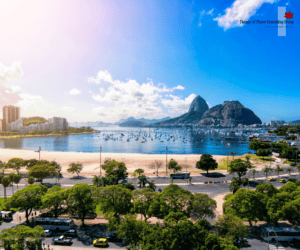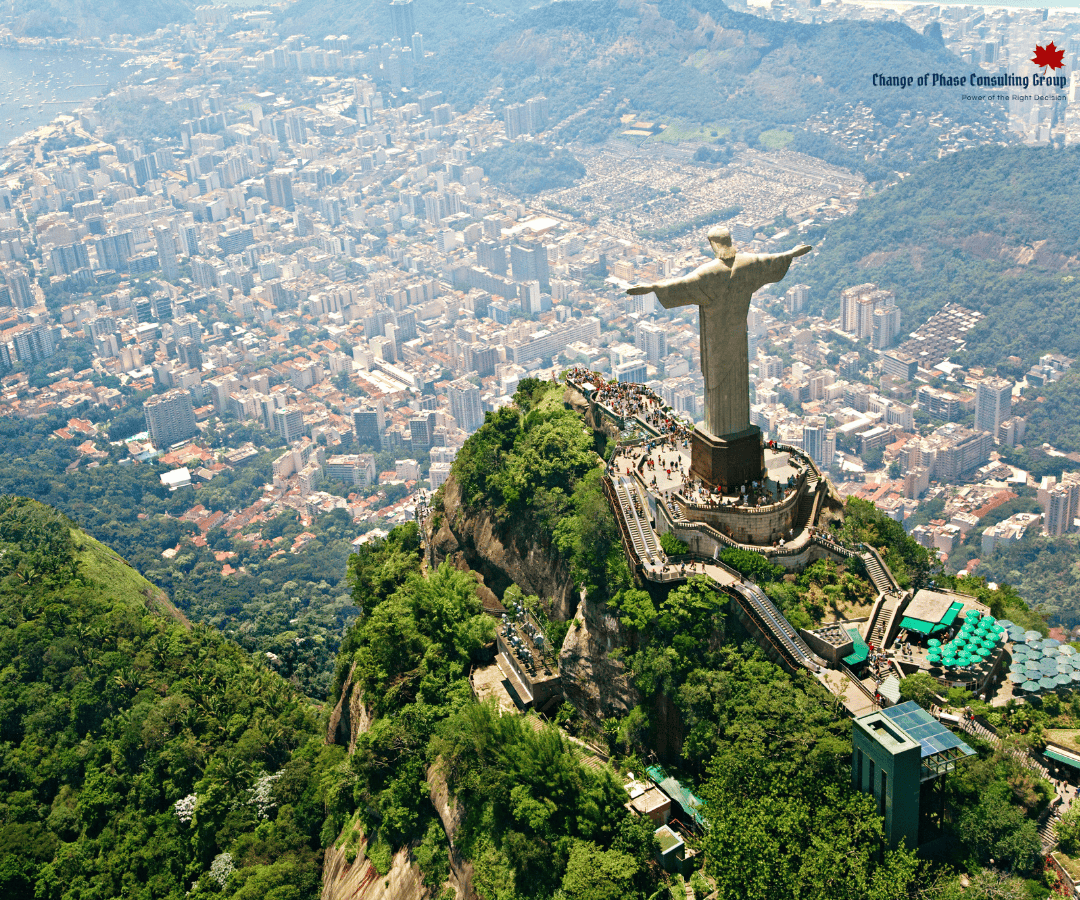Brazil has grown in popularity as a retirement destination for people from all over the world because of its breathtaking beaches, lively culture, and reasonably priced cost of living. The Visto de Aposentadoria, or Brazilian Retirement Visa, is a fantastic way to spend your golden years in one of South America’s most stunning and varied nations. This comprehensive guide will walk you through the steps of applying for a retirement visa to Brazil, including topics such as healthcare alternatives, income criteria, and the reasons Brazil is a great destination to retire.
Why Choose Brazil for Retirement?
Before we dive into the details of the retirement visa process, let’s take a look at why Brazil is such an appealing destination for retirees:
- Affordable Cost of Living: Brazil offers a lower cost of living compared to many countries in North America and Europe. Housing, food, and entertainment are often more affordable, allowing retirees to enjoy a comfortable lifestyle on a fixed income.
- Stunning Landscapes and Climate: From the white-sand beaches of Rio de Janeiro to the lush Amazon rainforest, Brazil offers a wide range of natural beauty. The warm climate, particularly in coastal areas, is also a major draw for those looking to escape cold winters.
- Rich Culture and Social Life: Brazil’s vibrant culture, with its rich music, festivals, and cuisine, creates a lively atmosphere that makes retirement exciting. Whether you’re dancing at Carnival or relaxing in a café, there is always something to enjoy.
- Quality of Life: With the right planning, living in Brazil offers high quality of life with access to modern amenities, such as restaurants, shopping, healthcare, and public transportation.
Step 1: Understand the Eligibility Requirements

To qualify for Brazil’s Retirement Visa, you need to meet a few basic eligibility requirements. These include age, income, and other documentation.
1. Age Requirement: While there is no strict age limit for the Brazilian Retirement Visa, applicants are typically over 60 years old. Some flexibility may apply depending on the circumstances, but being retired or near retirement age is essential
2. Proof of Stable Income: One of the most important requirements for obtaining a retirement visa is proving that you have a stable income source. The Brazilian government requires retirees to show they can financially support themselves while living in the country.
- Minimum Income: You must provide proof of a monthly income of at least
R$6,000 (approximately USD 1,200). This income can come from a pension,
social security, or other reliable sources of income.
- Spouse and Dependents: If you are bringing a spouse or dependent children, you will need to demonstrate that your income can support them as well. The required income increases slightly for each dependent.
3. Clean Criminal Record: Applicants must provide a criminal background check from both their home country and Brazil. Brazil will review this to ensure you have no history of serious criminal activity.
4. Health Insurance: Brazil requires all foreign retirees to have health insurance, either through an international plan or a Brazilian health insurance provider. Healthcare is essential, and having insurance ensures you can access medical care without complications.
Step 2: Gather the Required Documentation
The next step is to collect the required paperwork for your visa application after you’ve verified that you meet the prerequisites. What you’ll need is as follows:
- Valid Passport: Your passport must be valid for at least six months beyond your intended date of arrival in Brazil.
- Proof of Income: Bank statements, pension statements, or tax returns showing that you meet the required monthly income level.
- Birth Certificate: A certified copy of your birth certificate, translated into Portuguese (if required).
- Clean Criminal Record: A police clearance certificate from both your home country and from Brazil (if applicable).
- Health Insurance: Proof of health insurance that meets Brazil’s minimum requirements for foreign residents.
- Completed Visa Application: Fill out the application form provided by the Brazilian consulate or embassy in your country. Some countries may require additional forms or documentation, so be sure to check with your local consulate.
Step 3: Submit Your Application
You can apply for a retirement visa after you’ve gathered all the required paperwork. You can apply through Brazil’s Ministry of Justice or at the Brazilian consulate or embassy in your country of residence, depending on where you live.
- Submit Documents: Ensure that all documents are complete, up-to-date, and translated into Portuguese if necessary. Incomplete or incorrect applications can delay the process.
- Application Fees: There is a fee for processing the Retirement Visa application. The exact amount varies depending on the country, so check with the consulate for the latest fees.
- Wait for Approval: The processing time for a Brazilian Retirement Visa can take anywhere from a few weeks to a couple of months. Be sure to plan your move well in advance and keep track of your application status.
Step 4: Arrive in Brazil and Register with the Federal Police
You can visit Brazil after your Retirement Visa has been granted and you have received it. To finish the residence process, you must register with the Brazilian Federal Police (Polícia Federal) as soon as you arrive.
- Receive Your Residence Card (RNE): The Federal Police will issue you a resident identification card known as the Registro Nacional de Estrangeiro (RNE), which allows you to legally live and work in Brazil.
- Address Registration: You’ll also need to provide proof of your Brazilian address. This can be a rental agreement, property deed, or other official document showing where you will be living in Brazil.
Step 5: Enjoy Your Retirement in Brazil
 It’s time to start your new life in Brazil now that you have your residency card and retirement visa! Brazil has many different places to live and explore, from the busy streets of São Paulo to the stunning beaches of Florianópolis.
It’s time to start your new life in Brazil now that you have your residency card and retirement visa! Brazil has many different places to live and explore, from the busy streets of São Paulo to the stunning beaches of Florianópolis.
- Finding the Right Location: Depending on your lifestyle preferences, you can choose to live in a big city or opt for a quieter, rural setting. Coastal cities like Rio de Janeiro and Salvador are famous for their beaches and vibrant cultural scenes, while smaller towns offer a slower pace of life and closer-knit communities.
- Healthcare Options: Brazil has a public healthcare system (SUS) that provides free medical care to residents. However, many retirees opt for private health insurance due to shorter wait times and better quality of care. Several international insurers offer coverage for expats in Brazil, or you can choose a local provider.
- Social Integration: To fully enjoy your time in Brazil, it’s recommended to learn Portuguese, as this will help you integrate into the community, navigate daily life, and enjoy the rich culture even more. Many Brazilians speak some English, especially in larger cities, but speaking the local language will enrich your experience.
Step 6: Stay Informed and Compliant
It’s critical for retirees in Brazil to be up to date on local regulations, taxes, and any modifications to residency requirements. Make sure you follow Brazilian immigration laws and maintain an up-to-date residency card.
- Tax Considerations: Brazil has a tax agreement with several countries to prevent double taxation. It’s important to consult with a tax advisor familiar with Brazilian tax laws to ensure you meet all obligations.
- Renewing Your Visa: The Retirement Visa is typically renewable every year, but keep track of renewal dates to avoid any lapses in your legal status. Your income level and health insurance must remain in compliance for each renewal.
Final Thoughts
Brazil is one of the world’s most vibrant and diverse countries, and retirement there gives the chance to live a laid-back lifestyle. Brazil is a great option for anyone wishing to spend their retirement years in a beautiful and vibrant setting because of its kind people, low cost of living, breathtaking scenery, and vibrant culture.
By following the steps outlined in this guide, obtaining your Brazilian Retirement Visa is a manageable process that opens the door to a fulfilling and exciting new chapter of life. Happy retirement planning, and boa sorte (good luck) with your move to Brazil!










Leave A Comment